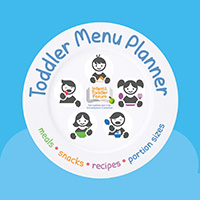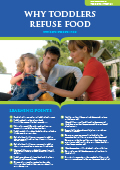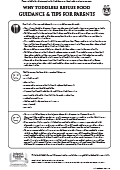
Use our Toddler Meal planning tool to ensure your 1-4 years old receives a balanced diet every day.
Find out more >
Use our toddler food tracker to check that your 1-4 year olds are getting a good balance of foods and activity
Find out more >
This educational programme for frontline professionals contains a range of practical resources on infant feeding.
Find out more >
Guidance & Tips for Parents

Food refusal is a normal phase that most toddlers pass through
- Fear of new foods in the second year may be a survival mechanism to prevent increasingly mobile toddlers from poisoning themselves through eating anything and everything.
- For some time toddlers may limit the variety of foods they eat. This phase will normally pass without any problems but will be more evident in some toddlers than in others.
- Your toddler may refuse a food if it is new to him or her. They need to taste it a few times to learn to like it, so always offer it the next time you are eating it.
- Toddlers refuse extra food when they have eaten enough. Your toddler may eat less food than other toddlers of the same age. If your toddler is growing and developing normally then he or she is taking the right quantity of food for his or her own needs.
- Remember that the quantity of food toddlers eat may vary from day-to-day. Some parents get anxious about this and toddlers then tend to react to parental anxiety by reducing intake.

Toddlers may also lose their appetite if they are:
- tired
- not feeling well
- shouted at
- pressured to eat more food when they have had enough
- pressured to eat food they dislike
- frequently offered foods that they dislike or find disgusting
- continually offered food and drinks throughout the day
- rushed at mealtimes
- feeling sad, lonely, anxious or insecure
- constipated
- anaemic

- For most toddlers faddy eating is just a phase that they eventually pass through. However if the problem persists or you have some concerns, speak to your health visitor or GP. They will be able to check your child’s growth and development.
- Very occasionally faddy eating is linked to medical problems or a memory associated with discomfort on eating. Your GP may be able to assess this and can refer your toddler to a paediatrician, or a speech and language therapist for oral-motor dysfunction, if necessary.
- There are some toddlers who are extremely faddy eaters but have nothing medically wrong with them. Such toddlers quite often get much worse at around 18 months, although they may have had problems with lumpy foods when these were first introduced. These children usually dislike getting their hands and face dirty, and are often sensitive to sound, touch or smells. Sometimes children grow out of this and start to improve their eating at around five years of age. It is especially important that these toddlers are not forced to eat food that they dislike as this may cause them to vomit and eventually affect their growth.




